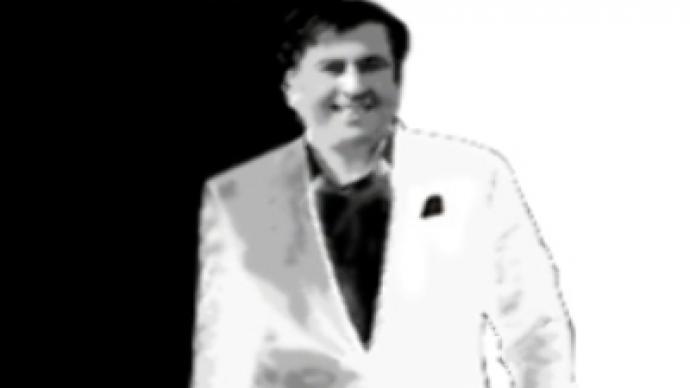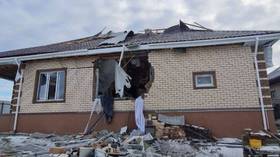Georgia’s ‘Scarface’: the rise and fall of Saakashvili

A year after mass anti-Saakashvili protests were held in the Georgian capital of Tbilisi the struggle of the country’s opposition continues. RT sums up Georgia’s recent history and tries to take a glimpse into the countr
Citizen S’s Rosebud
Mikhail Saakashvili came to power in 2003, following events that became known as the Rose Revolution. On November 23 a group of demonstrators stormed Georgia’s parliament.
They demanded the resignation of then president Eduard Shevardnadze after the results of parliamentary elections were judged to have been falsified.
Shevardnadze subsequently bowed out, leaving three heroes of the Rose Revolution – Parliamentary Chair Nino Burdzhanadze, then opposition leaders Saakashvili and future Prime-Minister Zurab Zhvania – in power.
According to the country’s constitution, Burdzhanadze became acting President and a date (January 4, 2004) was set for election, in which Saakashvili predictably won a landslide victory, getting 96% votes of a record 82.8% turnout.
Adjaria’s Velvet Revolution
With all the talk surrounding two newly recognised independent Abkhazia and South Ossetia, Georgia’s two other regions with tensions have largely eluded attention.
The Armenian majority of Southern Samtskhe-Javakheti region has repeatedly called for greater autonomy, while the South-Western Adjaria had spent a week separated from the rest of Georgia during the spring crisis of 2004.
Ruled by authoritarian Aslan Abashidze, Adjaria managed to capitalize on the early years of market economy, with its capital port of Batumi becoming a major transit hub for goods heading to and from Armenia, Azerbaijan, Kazakhstan and Turkmenistan.
With the majority of the aforementioned exports being oil, Abashidze preferred to keep the most of the transport and Black Sea tourism revenues in his region – something that would never suit the Saakashvili, who had aims at bettering the economy.
Sensing that Saakashvili will come for him sooner or later Abashidze heavily opposed the Rose Revolution, declared a state of emergency immediately after Shevardnadze’s ousting and sought to establish closer ties with Russia in hopes of getting support.
However, Russia was in no rush to undermine its relations with Georgia. Following a tense week of attempting to ignore both protests within his region and Georgia’s arms wiggling outside, and while flying to Moscow for advice following every new development, Abashidze resigned.
The events received its own soft – ‘Velvet’ – revolution label and Abashidze, who moved to Moscow, got his 15-year sentence in absentia.
Evident progress of economy
Having two very tough political issues resolved and shedding virtually no blood Saakashvili shifted his attention to economy, and it was an immediate success.
Employing economy professionals from the private sector into Zhvania’s cabinet, the most notable of which being Russian oligarch of Georgian origin Kakha Bendukidze, who became the Minister of Economy, Saakashvili’s regime managed to raise the GDP growth rate from 5% in 2004 to near 10% in 2007.
One of the ways of doing so was by easing the regulations regarding business and entrepreneurship. Georgia rocked the International Finance Corporation’s annual ‘Doing Business’ rating, that tracks indicators of the time and cost to meet government requirements in business start-up, operation, trade, taxation, and closure.
It climbed some 75 positions in 2007 alone, and with a 2% fall of unemployment, Georgia was named the reformer of the year. By 2009 (the rating for each year is published in September of previous year) Georgia is the 15th most business-friendly economy in the world, ahead of Germany (25), Switzerland (21) and way ahead of Russia (120).
Some even claimed that Saakashvili’s regime managed to root the corruption out of the traffic police – an area with a strong tradition of bribery ever since the Soviet era.
When I interviewed him in 2006, Bendukidze left the impression of a man not only proud of his achievements, but also one who sees a long road of improvement ahead of himself and his country.
Yet somehow, the events of 2007 went from good to bad.
Death of an ally and alienation of others
The roots of the problem began in 2006, when amid a rising economy Georgia suddenly started to address the problem of breakaway republics of South Ossetia and Abkhazia. The fact that it happened in between visits of U.S. senators to Georgia leaves little doubt on who gave Saakashvili the ill-timed idea.
Striving to bring back the breakaway regions, Saakashvili didn’t even spare his friends. These actions were not typical of country leaders, but more of mobster bosses like Tony Montana.
The minister in charge of regulating conflicts Georgy Haindrava – one of the key supporters of Saakashvili during the Rose Revolution – was dismissed with no remorse, after strongly opposing the idea of using force to solve the conflicts with South Ossetia and Abkhazia.
By then Saakashvili had already lost the wisest of his allies. In February 2005 Prime Minister Zhvania was found dead in a rented apartment. Police claimed he died of carbon monoxide poisoning due to an inadequately ventilated gas heater. Although, his death was ruled accidental.
Zhvania’s family continues to question the results of the investigation.
Zhvania was, as many believed, for Saakashvili what Manny Ribera was for Tony Montana in Scarface: the person, who managed to stop him on the brink of radical and irreversible actions.
A year after Zhvania’s demise Saakashvili started to fear for his position. He started a campaign to intimidate the opposition by mass arrests. Saakashvili also attempted to initiate an early presidential election in 2008, though having been elected in early 2004 he was entitled to office till 2009.
In August 2007 when yet another of Saakashvili’s former allies – ex-Defence Minister Irakly Okruashvili – made grave accusations against the President, Georgia saw itself on the brink of civil war.
Okruashvili also gave some new info on Zhvania’s death, and was immediately detained by police.
November 7, 2007
This led to mass protest organized by none other than Haindrava in the early days of November. Tens of thousands gathered around the parliament building in Tbilisi demanding Saakashvili’s resignation on November 1.
Saakashvili initially dismissed the protest as ‘a campaign’ of lies. Then, on their sixth day of the standstill, with some 70,000 protesting on the streets of Tbilisi, he addressed the nation, calling for calm.
Meanwhile out on the streets, riot police used tear gas, sound guns, water canons and rubber bullets many of which were believed to be supplied by Azerbaijan to disperse the crowds.
Opposition channel Imedi TV which has been called ‘the voice of opposition in Georgia’ was shut down. It was broadcasting live when the presenter in the studio suddenly announced that there were riot police and special forces in the building. They then detained the billionaire tycoon Badri Patarkatsishvili owned TV station’s employees.
RT's own correspondent Ekaterina Azarova and cameraman Evgeny Litovko, were caught up in the police crackdown. They were conducting a live television broadcast when special forces began to spray tear gas, as a result of which our team suffered tear-gas poisoning.
To watch RT’s footage of the events, please follow the link.
By the evening of November 7, Saakashvili – again rather like Tony Montana – was relegated to a state in which his enemies were once his allies.
Repeating Abashidze’s actions of 2004, he declared a 15-day nationwide state of emergency.
January election and war
Having the political initiative in his tight grip Saakashvili gave the green light for a snap election in January, banking on the lack of time the opposition had for choosing and preparing their candidate.
It was a risk, but also his only chance to end the disturbances, which already brought about the Human Rights Watch’s criticism for using ‘excessive’ police force and warnings of growing authoritarianism from International Crisis Group.
It took some time for the opposition to decide on the single candidacy of Levan Gachechiladze, while their main financial supporter Badri Patarkatsishvili announced he would campaign against Saakashvili in order to keep Georgia from sliding into ‘dictatorship’.
Patarkatsishvili’s Imedi resumed broadcast in December, but refrained from any politics related discussions till the election.
Despite having this kind of opposition, Saakashvili prevailed in the election with 53.47% of the vote, with both Gachechiladze (25.69%) and Patarkatsishvili (7.10%) lagging far behind. Opposition supporters claimed the results were rigged and went on hunger strike demanding a second round election.
Meanwhile in London, unable to handle the defeat, 52-year-old Patarkatsishvili died of a heart attack.
In April a mysterious American businessman Joseph Kay, claiming to be the oligarch's step cousin, appeared in Tbilisi to claim the rights for the Imedi channel backed by Saakashvili’s government.
Though Kay vowed not to interfere with the channels editorial or personnel policies, the latest Imedi’s incarnation was politically harmless.
With no alternative TV channels left in Georgia apart from the state-backed ones, Saakashvili had achieved yet another victory. His United National Movement party dominated the parliamentary election in May.
August saw the ever more self-confident Saakashvili let the age-long tensions between Tbilisi and South Ossetia escalate into a full-blown military conflict with Russia’s participation, which lead to Russia’s recognition of the breakaway countries’ independence in September.
US looking for new Georgian leader?
In the dying days of August 2008 a number of prominent political figures from Georgia visited the US, including the speaker of the Georgian Parliament David Bakradze, chairman of Georgia’s Republican Party David Usupashvili, Burdzhanadze (who currently heads the new opposition party United Georgia), and David Gamkrelidze, leader of the New Right opposition party.
This was viewed as a move to choose a new leader for Georgia, sparking rumours that Burdzhanadze has received the overseas blessing for the post.
Gamkrelidze in particular flew across the Atlantic to take part in the 2008 Republican National Convention, where he was supposed to conduct meetings with members of US political elite. In an interview given at the time he suggested that to overcome the political and economic crises Georgia will need to hold an early presidential election.
With Obama in the White House, Gamkrelidze may have to abandon his plans made together with the Republicans.
However, the short but bloody war obviously put Saakashvili’s regime into an ambiguous and unpredictable position.
Now a year after violent mass protests the opposition is once again on the streets…
Ruben Zarbabyan, RT












